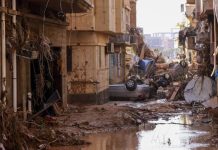
Syrian President Bashar al-Assad arrived
Sunday in the United Arab Emirates, his second visit to the Gulf since a
devastating earthquake last month prompted Arab outreach to his
internationally isolated government.
The trip — Assad’s second to the oil-rich UAE in as many years — comes
after a visit to Oman last month, his only official engagements in Arab
countries since the start of Syria’s war in 2011.
“Bashar Al-Assad, President of the Syrian Arab Republic, arrived today
(Sunday) in the UAE on an official visit, accompanied by his wife, Asma,” UAE
state media said.
The Syrian leader was greeted in the capital Abu Dhabi by Emirati President
Sheikh Mohamed bin Zayed Al Nahyan, official news agency WAM reported.
Abu Dhabi, which normalised relations with Assad’s government in 2018, has
led aid efforts in the aftermath of the February 6 earthquake that struck
southeastern Turkey and northern Syria, killing tens of thousands.
Analysts say a diplomatic momentum generated by aid efforts in the quake’s
aftermath could bolster Damascus’s relations with Middle Eastern countries
that have so far resisted normalisation after more than a decade of war.
The UAE had pledged more than $100 million in assistance to quake-hit Syria,
by far the largest sum by any single nation.
It had also dispatched a search and rescue team and provided thousands of
tonnes in emergency relief items.
The UAE’s foreign minister, Sheikh Abdullah bin Zayed Al Nahyan, visited
Syria last month — the first senior Gulf official to do so since the quake.
During the war in Syria, Assad had rarely gone abroad, with the notable
exception of allies Iran and Russia — where he visited again this week and
met with President Vladimir Putin.
On Thursday, Iran’s top security official Ali Shamkhani met the Emirati
president in Abu Dhabi and held talks with UAE national security adviser
Sheikh Tahnoun bin Zayed Al Nahyan, who on Sunday attended the welcoming
ceremony for Assad at the presidential palace.
The foreign minister of Saudi Arabia, which has also sent quake aid to Syria,
said last month a consensus was building in the Arab world that a new
approach to Damascus would be needed to address humanitarian crises including
the quake.







